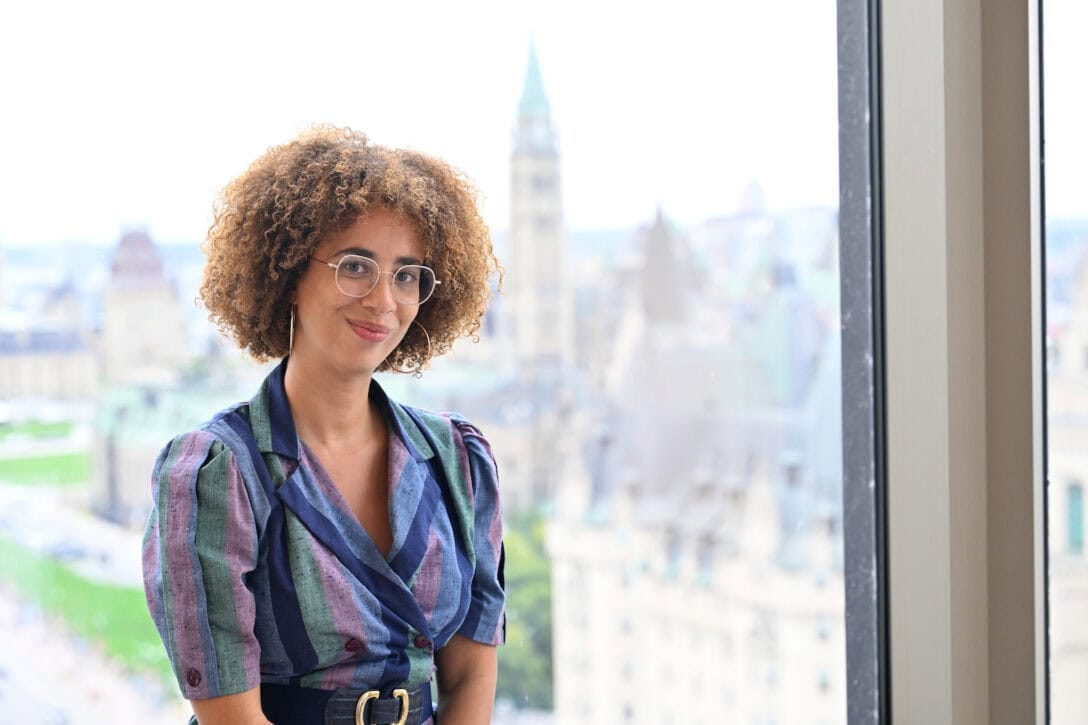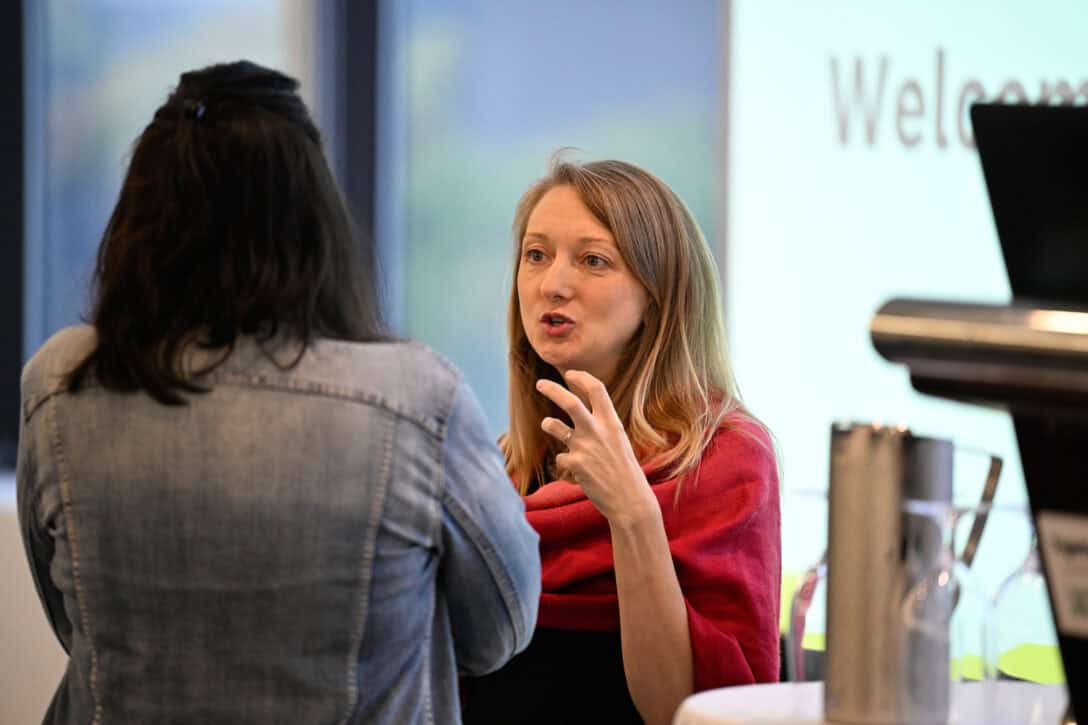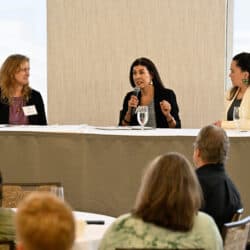Philanthropic Foundations Canada’s 25th anniversary conference addressed polarization head-on – with tangible resources from conflict mediators to move forward during tense times.
At the opening plenary of the 25th Philanthropic Foundations Canada conference, Mastercard Foundation president and CEO Reeta Roy laid out the landscape of today’s times: “tumultuous,” she said. “Divisive.” While offering reasons for hope – including increased engagement between Indigenous communities and philanthropic foundations – she also acknowledged the difficulty of this year for philanthropic and charitable organizations across Canada.
The difficulties are, of course, many. The conference made clear that foundations are working to address the impacts of what is often described as a polycrisis, one that involves the effects of climate change, inflation, a mental health crisis, and ongoing impacts from the long tail of the COVID-19 pandemic – just to name a few. But another difficulty emerged time and time again at this year’s PFC conference in Ottawa: the challenges of polarizing ideologies and vastly different values and ideas.
There isn’t a group in the sector that has not felt the impacts of October 7, 2023, or the ongoing crisis in the Middle East. There are many other rifts, tricky conversations, and divisions, but October 7 brought polarization into sharp focus. Now, following the election in a deeply politically divided United States, it is ever clearer that society is organizing itself along often-polarized ideas about what is right, good, and just.
Perhaps nowhere has this been more poignant in the past year than on university campuses. “It was a nightmare,” said Graham Carr, president and vice-chancellor at Concordia University, speaking at a panel discussion entitled “Philanthropy and the Maelstrom Facing Universities.”
“No one had the training to understand or manage this kind of conflict.” Carr was referring to the backlash following October 7 on university campuses across North America. Concordia University was among them, with clashes between activists on both sides, heavy police presence, arrests, and court cases continuing to decide whether some groups will be allowed on campus.
Growth is only realized through some level of discomfort.
Émilie Nicolas, McGill University
But the panel was there to discuss hope – and a way forward from the maelstrom. “Universities represent the possibility to have a positive dialogue,” said Émilie Nicolas, a columnist and public speaker who is also a course instructor at McGill University. “The possibility for public dialogue between well-informed viewpoints is the social space represented by universities.”
Public dialogue means more than just shouting one’s views, of course. Nicolas spoke about the importance of conversations between people who disagree with each other. There is, she said, a “fear zone, comfort zone, and a growth zone,” each a way of being in dialogue. “Growth is only realized through some level of discomfort,” she added.

Moving people into the possibility of the growth zone – and providing training to better deal with polarization before it becomes a nightmare scenario – has been a focus for a PFC project in recent months. And at the PFC conference, attendees were invited into it as well, with numerous sessions aimed at addressing “trends and tensions” in the sector head-on.
PFC has taken steps to invite difficulty into the room.
Mohammed Hashim, Canadian Race Relations Foundation
“PFC has taken steps to invite difficulty into the room,” Mohammed Hashim, chief executive officer and executive director of the Canadian Race Relations Foundation, said on the last day of the conference, noting that “technically and practically it’s hard to have these conversations – in places where there’s wealth, where there’s comfort, where people know what they’re doing and feel good about how they’ve done it for a long time.”
But in conference rooms in Ottawa in September, hard conversations were themselves a topic of conversation as philanthropic groups from across Canada gathered – together/ensemble! – for the 25th Philanthropic Foundations Canada conference.
The importance of the ‘middle ground’ – as seen through a conversation about Palestine and Israel
Among the poignant and direct sessions about conversing across polarized views was one facilitated by Alicia Kuin, a mediator who specializes in conflict analysis, process design, and conflict-management consulting. Kuin spoke of the “fraying of the social fabric,” which she says has also resulted in a “fraying of the sector.”
“Dialogue in the sector is not taking place in the way that it needs to,” she said.
Kuin had spent time throughout the year working on PFC’s dialogue initiative, called Towards Collaboration and Growth: Productive Dialogue in a Polarized World, which she presented about at the conference. Speaking to a packed room, Kuin addressed a central tension of today’s times – in a world of social media and siloed thinking: “We seem to be talking about people instead of talking to people,” she said. “People – more now than ever – step back from relationships when even a hint of political difference shows up in conversations.”
Dialogue is risky business. It is hard. We need to de-risk dialogue.
Alicia Kuin, mediator
The antidote, she said, is what she dubbed “the middle ground” – not an endorsement of centrist politics, but a place in the middle of polarized views where people with different opinions, backgrounds, cultural contexts, and more can come together to respectfully engage with each other – and, crucially, with each other’s views. She acknowledged how difficult that can be. “Dialogue is risky business. It is hard,” she said. “We need to de-risk dialogue.”
And that, she said, means developing respect for other individuals and their life experiences, even when they’re very different from our own.

In a powerful moment, Kuin welcomed two speakers to share the stage with her: Bashar Alshawwa, a Palestinian water diplomacy specialist, and Niki Landau, a Jewish mediator and conflict-management facilitator.
Both spoke about their personal histories and how those had led to entrenched positions – and their journeys to the middle ground. Alshawwa spoke about the devastating effects of the war in Gaza on his family and how he had lost 128 family members to the war to date. Landau spoke about losing a close friend to an attack when she was younger and the resulting fear and anger at “the other side.” They spoke about the risks to their relationships within their own families and communities, as people on “their side” felt they were alienating them by engaging with the perceived enemy. Both talked about how these tragedies could have led them down the road of hating the other – and to shutting off the possibility of dialogue.
“It’s easy to listen compassionately to people you agree with,” Landau said. “The challenge is to listen compassionately to people you disagree with.”
It’s easy to listen compassionately to people you agree with. The challenge is to listen compassionately to people you disagree with.
Niki Landau, mediator
Near the end of the session – when many tears had been wiped from eyes in the room – Hashim, the executive director of the Canadian Race Relations Foundation, spoke up. “People feel like what the other group is doing is out of hatred for them,” he said of polarized positions. “Actually, it is done out of love for their own.” He added, “A shift of thinking allows you to start thinking about how to create empathy.”
Seeing two people with so much at stake walk the talk of difficult conversations in the middle ground had an obvious impact on many in the room.
I believe philanthropic actors can use our voices to combat division and share a vision for the kind of country we want to live in.
Jane Rabinowicz, McConnell Foundation
“If people who have been through so much and lost so much can still rise above, this is a lesson to us all,” says Jane Rabinowicz, president and CEO at the McConnell Foundation, who also attended the session. “This is another lesson for us to look deeply at how we are operating and whether we are improving things or potentially contributing to polarization and making things worse. I believe philanthropic actors can use our voices to combat division and share a vision for the kind of country we want to live in. Everyone has a role to play in improving the situation.”
The conversation left many people in the room inspired, including the speakers themselves.
“Meeting influential people who are dedicated to humanity can be incredibly inspiring, the support and empathy I received from the audience and the conference leadership were truly inspiring and reinforced my commitment to peacebuilding in Canada,” Alshawwa wrote on LinkedIn after the conference. “These experiences remind me of the power of advocacy, dialogue, compassion, and community in building a more peaceful future.”
Looking ahead after the conference with tools and new ideas
PFC isn’t actively planning another dialogue initiative. But Sara Krynitzki, director of public affairs and research at PFC, emphasized its value in an email. “[The dialogue initiative] was a very heavy lift for PFC, but well worth the effort,” she wrote. “It was designed with an eye for being a source of learning and inspiration, and potential adaptation and replication in the future, depending on interest and need.” She added, “At this time, PFC does not have plans to offer the program again, but stands ready to support and promote related initiatives or those inspired by our work that leaders in the sector are advancing across the network to combat polarization and foster learning, understanding, and community.”
One of the outcomes of the PFC conference includes a tangible guide to resources that address polarization, compiled by Kuin. She created it, she writes, “to offer assistance to individuals and organizations within the Canadian philanthropic community navigating these turbulent times. Whether directly impacted by polarization or seeking to understand and address conflicts, this guide aims to provide a diverse array of resources; serving not as a comprehensive compilation, but as a catalyst for exploration, discovery, and growth.”
There’s plenty of reading material listed – articles like “High Conflict vs Generative Conflict” and “What If Instead of Calling People Out, We Called Them In?” and books with names like High Conflict: Why We Get Trapped and How We Get Out, by Amanda Ripley (whose work was also highlighted in a PFC panel session called “Complicating the Narrative: New Forms of Journalism”) and The Righteous Mind: Why Good People Are Divided by Politics and Religion, by Jonathan Haidt.
But the tool kit also contains links to podcasts, tips for facilitating listening circles, workshops on resiliency and self-care training, and sample questions to ask people you disagree with or to ask as conversation starters. Suggested questions vary, and it’s easy to imagine how the conversations they could lead to might become difficult: How do you decide what news sources to trust? What words would you use to describe the most important values held by people in your culture? What life experiences have you had personally, or in your family of origin, or in your community, that have influenced how you feel about the other side? Can we explore some common ground that we have about this and start from there?
In an email after the conference, Rabinowicz writes that she sees “a dynamic of critique between organizations that are aligned in many ways but focus instead on the things that separate them.” She adds that “for those of us who are concerned about pressing issues like climate change and social justice, this is not a time to fall into that trap. It is a time for ambitious collaboration, doing more together than any one of us can do on our own.”
Often what’s right in front of us, what doesn’t necessarily ideologically divide us, is the space we need to start from.
Meredith Preston McGhie, Global Centre for Pluralism
The idea of focusing on what people – and organizations – do have in common came up numerous times during the conference. “Often what’s right in front of us, what doesn’t necessarily ideologically divide us, is the space we need to start from,” Meredith Preston McGhie, secretary general for the Global Centre for Pluralism, said at a session alongside Hashim at the PFC conference called “Cultivating Inclusive Communities and Connections for the Road Ahead.”
“Division creeps up on us,” she said. “We have to have difficult and complicated conversations.”
Difficult conversations – and engaging with views you find abhorrent
Many sessions at Together 25 Ensemble shared a similar theme: difficult conversations are, well, difficult. But presenters said time and again that they’re worth having, not least because they can help to diffuse anger. “People stop shouting if they think someone’s listening,” Preston McGhie said of the importance of making people feel heard as a way to disarm hatred and vitriol.
But difficult conversations can come with an underbelly that several speakers addressed. As Kuin pointed out, dialogue is not appropriate for everybody at every time and might feel more painful than productive to some people at some times. And what if listening in itself feels like enabling something reprehensible? “Often we struggle because it also feels like by listening you are acknowledging and allowing hateful speech,” Preston McGhie said. “That’s a real dilemma, right? Because we also have to come to places where we can understand people that we deeply, deeply disagree with.”
Hashim agreed, noting that declining to listen to views we find hateful or abhorrent doesn’t make them disappear. “We cancel them and they go away?” he said. “That’s not going to happen.”
Some of these divisions are creeping up on us here, and we don’t know really what to do to have these types of difficult conversations.
Meredith Preston McGhie
Preston McGhie, whose background includes facilitating peace processes in Nigeria, Somalia, Sudan, and South Sudan, was careful to note that figuring out how to understand hateful ideas is a tool to disarm them – to enable society to do something with that understanding “to change why that radicalization sits where it sits and why people sit at the extremes.”
“Some of these divisions are creeping up on us here, and we don’t know really what to do to have these types of difficult conversations,” she added, noting that “sometimes in Canada our comfort has gotten in the way of us having some really, really tough conversations.”
“Philanthropic and non-profit organizations are not immune to polarization – we can contribute to it, and we can also help reduce it,” Rabinowicz says. “Self-awareness in these moments is crucial. Are we working in an echo chamber? Are we making efforts to speak with people who hold different views?” she asks. “We need to build skills to identify and reduce bias, uncover and address policy issues in our organizations and institutions, and practise doing things differently. I believe this is not a time to double down on working with the same people in the same ways. This is a time to work differently.”
“Corking the pain versus exploring it is critically, critically important. And I don’t think [exploring it] happens unless we are able to hear and feel for others who we assume to be our enemy,” Hashim said at the conference. “We have to figure out what are the opportunities to move things forward in those moments of crisis.”

